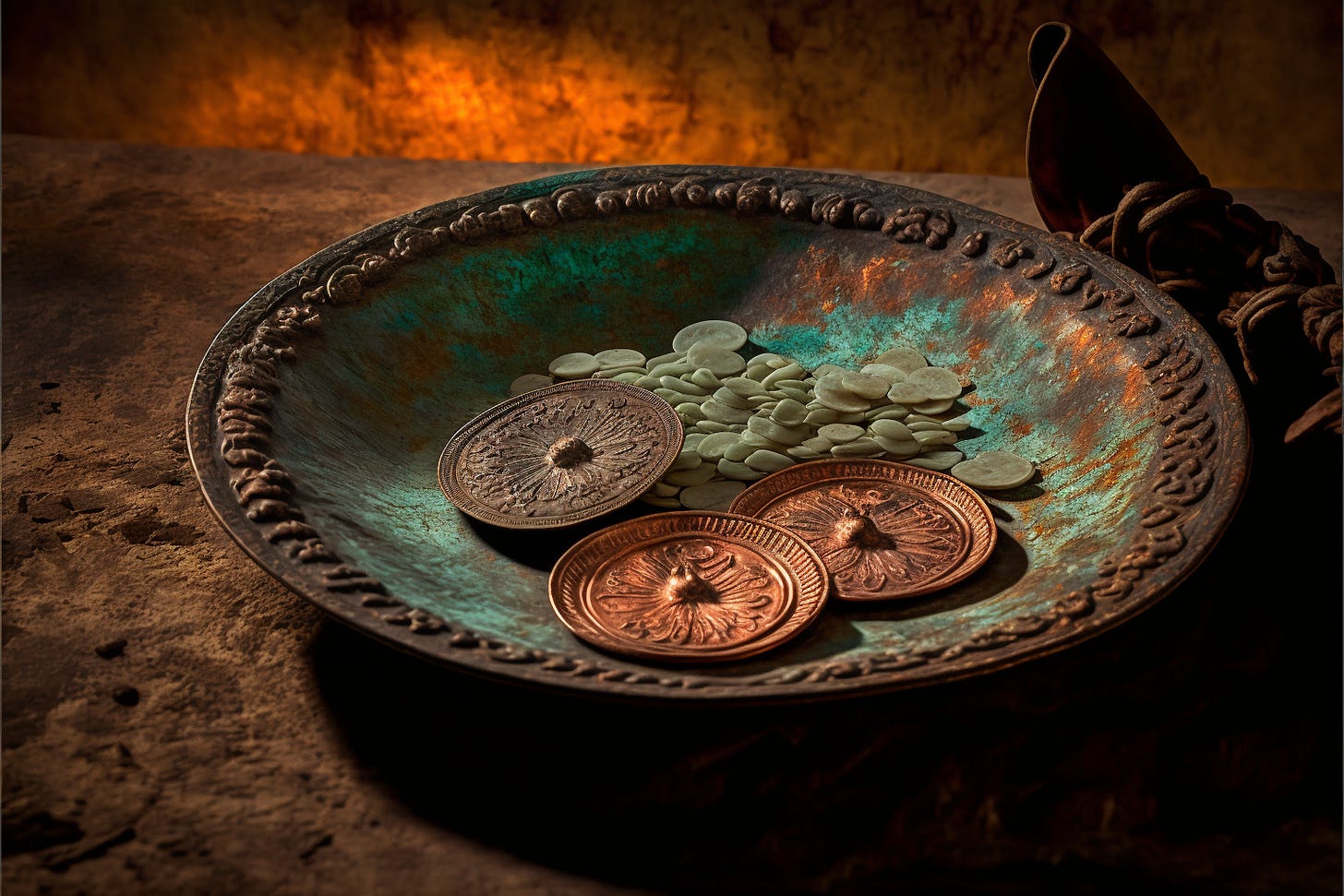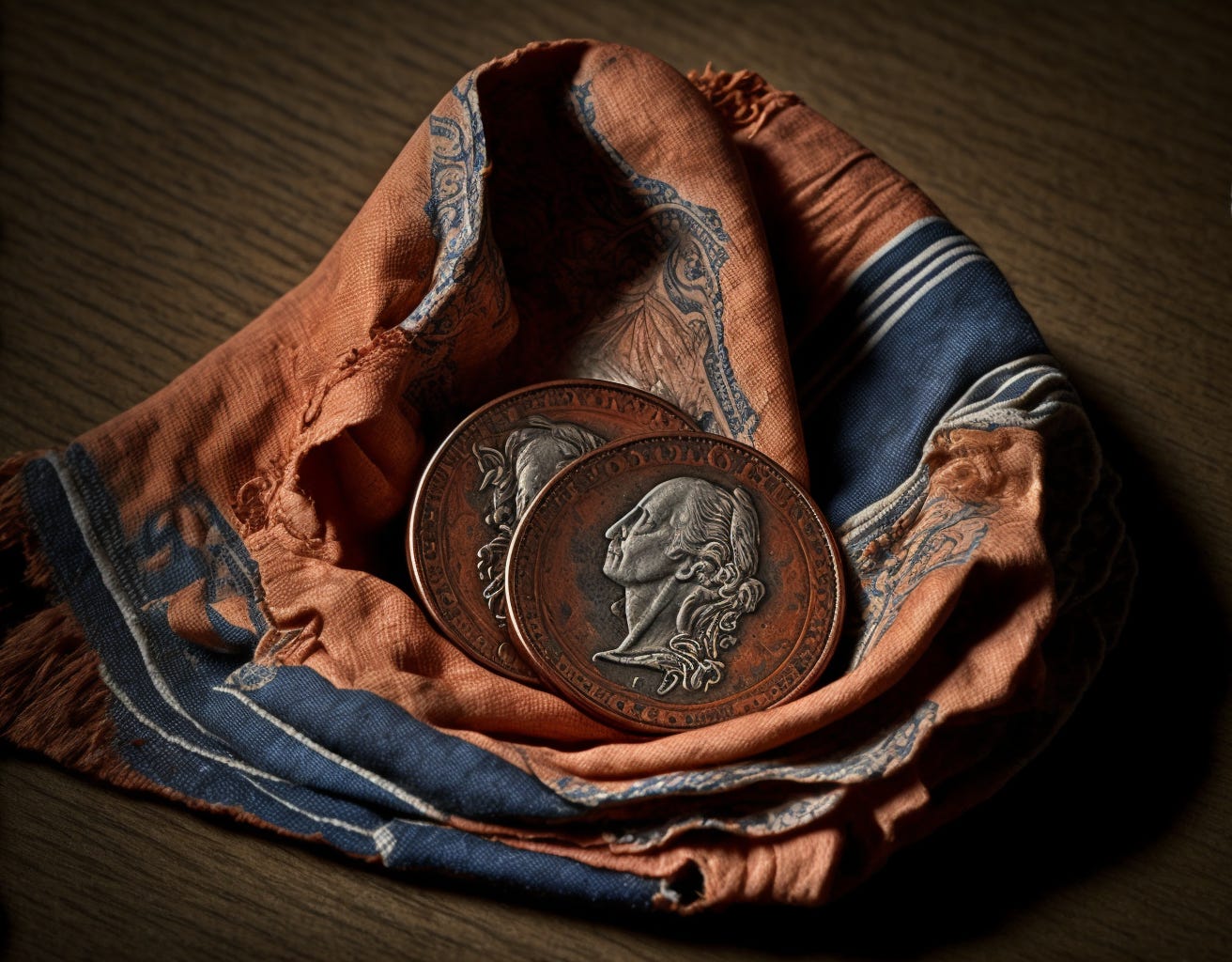Dear reader,
Somehow, the first month of the new year is already behind us. I hope this week’s installation finds you and your loved ones well. Today, I am sharing the first sermon I delivered at St. Mary’s Episcopal Church in Harlem on November 7, 2021— my first foray into exegesis homiletics (yikes)! I hope you will join me in exploring these biblical passages and considering what they mean for the ongoing pursuit of justice and radical compassion. Thank you, as always, for your readership and support.
The word of the Lord came to Elijah, saying, “Go now to Zarephath, which belongs to Sidon, and live there; for I have commanded a widow there to feed you.” So he set out and went to Zarephath. When he came to the gate of the town, a widow was there gathering sticks; he called to her and said, “Bring me a little water in a vessel, so that I may drink.” As she was going to bring it, he called to her and said, “Bring me a morsel of bread in your hand.” But she said, “As the Lord your G-d lives, I have nothing baked, only a handful of meal in a jar, and a little oil in a jug; I am now gathering a couple of sticks, so that I may go home and prepare it for myself and my son, that we may eat it, and die.”
Elijah said to her, “Do not be afraid; go and do as you have said; but first make me a little cake of it and bring it to me, and afterwards make something for yourself and your son. For thus says the Lord the G-d of Israel: The jar of meal will not be emptied and the jug of oil will not fail until the day that the Lord sends rain on the earth.” She went and did as Elijah said, so that she as well as he and her household ate for many days. The jar of meal was not emptied, neither did the jug of oil fail, according to the word of the Lord that he spoke by Elijah.
(1 Kings 17:8-16)
As Jesus taught, he said, “Beware of the scribes, who like to walk around in long robes, and to be greeted with respect in the marketplaces, and to have the best seats in the synagogues and places of honor at banquets! They devour widows’ houses and for the sake of appearance say long prayers. They will receive the greater condemnation.”
He sat down opposite the treasury, and watched the crowd putting money into the treasury. Many rich people put in large sums. A poor widow came and put in two small copper coins, which are worth a penny. Then he called his disciples and said to them, “Truly I tell you, this poor widow has put in more than all those who are contributing to the treasury. For all of them have contributed out of their abundance; but she out of her poverty has put in everything she had, all she had to live on.” (Mark 12:38-44)
Who are the Widows? This pairing of Gospel and Hebrew Bible readings each tell stories about widows and extreme poverty. But do you notice something here? We aren’t told anything about the widows that Elijah encounters in Zarephath or that Jesus sees in the Temple. We don’t know their names, their ages, or their circumstances. They are the faceless marginalized and dispossessed, the vulnerable and abandoned.
Isn’t this often the way we still discuss and think about the vulnerable Other? Leaving these details out, I think, might make it seem like they’re unimportant — or worse, that these people are not as valuable to G-d as we are.
I started to wonder about these nameless widows, women apparently left alone in the world without any families or social structures to support them. What we do know is that they are both burdened by the worst poverty we can imagine. The widow that Elijah meets in Zarephath is presumably a young woman. We find her collecting sticks to build a fire, preparing to cook the very last of the flour and oil she has, what she says will be the last meal for her and her son. I imagine that her son must be quite young, or perhaps ill or disabled, to still be in her care. I tried to put myself in her place, to imagine the despair and anguish of being a mother who cannot ensure her child’s survival. How prolonged her suffering must have been to have exhausted all available options and to accept as inevitable imminent death by starvation for herself and her son. What would she have been feeling and thinking as she prepared that final meal, fearing it would be the last time she would feed her child before they succumbed to death? Could there be a greater hopelessness and resignation?
A lot is left to the imagination about the widow, inviting a closer, more empathetic reading of the text. And I think such a reading is important, otherwise we might make the mistake of minimizing her despair and overlooking her mortal peril in service to a teaching about having a disembodied, unshakeable faith in G-d. And while it may be more comfortable to not look too closely at her despair, throughout the Bible we’re called to bear witness to all forms of suffering and to be in service to those who suffer. Not because it is easy, but because it is hard. Because it forces us to reckon with uncomfortable realities and unjust systems. Because we are called to do the work of loving justice.
Elsewhere in Scripture, Jesus indicates that all of Israel and Phoenicia, where Zarephath was, were suffering at this time from a drought that lasted three and a half years. He says that there were many such widows during Elijah’s time. (See Luke 4:25-27) And this unending drought was desiccating the land because, in the beginning of this chapter, Elijah had declared to King Ahab that there would be “neither dew nor rain these years, except by [his] word.” This is Elijah’s first appearance in the Bible, and his first act as a fledgling prophet. King Ahab had recently begun his reign as king of Israel and took Jezebel, a Phoenician princess, to be his queen. The Phoenicians worshiped the storm god Baal and, perhaps to honor his bride’s religion, Ahab erected a temple to Baal in Samaria, the new capital of Israel, suggesting that he tried to make this the official state religion.
Scripture memorializes Ahab as the worst of the kings of Israel, responsible for a downward spiral into idolatry that is accompanied by Jezebel’s decree to massacre all of the prophets of the G-d of Israel. Now, Baal is classically presented as the enemy of the G-d of Israel. And this is important for understanding why Elijah threatened Ahab in the way that he did. Baal was worshiped by Ancient Near Eastern civilizations for many centuries because of the belief in his power over rainfall and fertility — essential ingredients for life in agricultural societies. Baal worship was performed with the hope of ensuring rain for good harvests. Elijah’s declaration to Ahab that it would not rain — that there wouldn’t even be dew on the ground without his say-so — was a direct challenge to those who sought to usurp the G-d of Israel. The following three and a half years of drought served as testament to G-d’s supremacy.
During those years, however, the widow and countless others suffer the consequences of the actions of the powerful Ahab and Jezebel. If they had repented, maybe the drought would have ended much sooner. Maybe fewer innocent people would have suffered and died. I am reminded of our current climate crisis, and the refusal of our global powers and industries to change their ways. Due to their allegiance to wealth and power, they turn a blind eye to the vast suffering their inaction creates. But, just as marginalized voices are globally leading efforts to advocate for climate justice, so too does G-d repeatedly choose to use the poor and weak, the ill and outcast to humble us, that we might stop privileging power and wealth but see what is truly important in this life.
After Elijah’s declaration to Ahab, G-d instructed him to hide in the wilderness beside a brook east of the Jordan River. Elijah would drink from the brook and G-d would send ravens with bread and meat to feed him, but eventually the brook dried up as there had been no rain. G-d then directed Elijah to travel to the Gentile village of Zarephath where G-d had commanded the widow to feed Elijah, which is where we enter into the story in this reading.
Having more of the context, let’s revisit this passage. Elijah, an Israelite, travels about a hundred miles on foot to Zarephath in Phoenicia (Jezebel’s homeland) presumably while evading capture and suffering due to the drought. He addresses the first woman he sees at the city gate. She is a Gentile. We don’t know what, if anything, marks Elijah as a prophet of the G-d of Israel or the Gentile woman as the widow he is seeking, and we don’t know to what extent — if any — they even recognize each other. But he calls to her and asks her to bring him a little water that he could drink. After all, there is still a drought. As she goes to fulfill his request, he asks that she also bring him a morsel of bread. Elijah is not asking for much. Just a little. But even so, the widow responds that she has only a handful of flour and a little oil that she was about to prepare as her and her son’s final meal. She has next to nothing left for them to survive on.
Now it sounds more audacious that Elijah, who has just heard that this woman and her son are about to starve to death, asks her not only to share the last of her food with him, but to serve him first, feeding herself and her son from the remainder, promising her that there would be enough. In response to this request, the text says that “she went and did as Elijah said,” which, to me, sounds unrealistically accommodating for a woman whose child was about to starve to death. Imagine the amount of trust she must have had in the assurance being offered to her. Who among us would give up the last meal that stood between us and death? But Elijah is ministering to her by delivering a message of G-d’s promise of provision even as he himself is in similar need. G-d spoke through Elijah to assure them both that G-d knew their needs and would provide for them, even though Elijah had nothing to show the widow about such abundance. He opens himself to receive it through her. This is how we are called to serve one another. Not to overlook our suffering, but to show up with it, broken open, in need, connecting with others through sharing hope.
An interesting detail about Zarephath is that its name means “smelting-place” because it was the place where the Phoenician idols were cast. It is likely there where any idols of Baal would have been crafted and sent to Israel. It was also known as the “crucible,” and served as the place of refinement for Elijah’s ministry. A kind of testing by fire, both for Elijah and the widow. What could demand more faith than to be surrounded by barrenness and scarcity, to face certain death and to trust in G-d’s abundance and provision? This is not to say that our suffering is just a test from G-d or that we suffer due to a lack of faith. Quite the opposite. G-d is with each of us in our suffering, nearer to us than we can possibly fathom.
The Gospel of Matthew tells us that not even a sparrow falls to the ground that G-d is unaware of. This passage tells us that G-d commanded the widow to provide sustenance for Elijah. And by meeting Elijah’s needs, so too are the needs of the widow and her son miraculously met. Even in our own times of need, perhaps especially then, G-d works through us to meet the needs of others, healing us all. G-d uplifts and makes holy use of even our brokenness and desperation. G-d’s life-giving provision triumphs over death. The widow receives the promise of sustenance and her death sentence is overturned. G-d’s eternal triumph over the power of death is the promise we hear through Jesus time and time again. The promise of G-d’s sustaining hope, of never being abandoned, of being fed, loved, and cared for.
“…but she out of her poverty has put in everything she had, all she had to live on.”
As I began reflecting on this pair of Scripture readings, I felt a little wink from G-d and my grandfather in the Gospel passage. Here we are called to witness, through Jesus’ eyes, a destitute widow who is giving her last two copper coins to the Temple treasury. She has offered everything she had to live on. Again, certainly, an act of tremendous faithfulness. Jesus tells the disciples that those two pennies are worth more than all that the wealthy give out of their abundance. Those two pennies are also something of a sign to me, and my family.
My grandfather loved to tell a story from when he was growing up across the river in Bayonne. The gist of it is that his mother would drop a handkerchief out of their apartment window down to him on the sidewalk below. Inside the handkerchief would be two pennies. With those two pennies he was able to go down to the corner store and either buy a Charlotte Russe or a pickled tomato. This was a big treat, and a deeply beloved childhood memory of his. At some point, this memory evolved into the phrase “love you two pennies,” which has become something of a family motto. Over the years it has taken over our email signatures and text responses, even finding its way onto embroidered hats and penny keychains. For us, it is a declaration of immeasurable, inclusive love.
I am reminded of the countless times my grandfather would hug me and tell me he loved me.
“How much?” he would ask.
“Two pennies,” I would say.
“That’s right.” And then, always, he would remind me:
“The door is always open for you, you know that?”
Even when I was living with them, he would remind me. There was always a room for me. I always had a place where I would be welcomed home.
This is the promise that G-d shares with us: Love without measure. Love that asks for nothing in return. A love that is ever-present, and a door that is always open. There is a promised home that awaits us and lives within us. A home where no one suffers or feels abandoned, a place where all needs are met with miraculous provision. May we remember that promise and share it with others. May we provide sustenance to others with an outpouring of love and an outstretched hand. For we are made in the image of G-d, who gives justice to those who are oppressed, and food to those who hunger. May it be so.







Dear Jennifer & Alex,
Your calming voices and thoughtful recollections, especially of your life-altering experiences of “being one with Nature” were so inspiring.
Jennifer, how Blessed are those who receive your Loving Chaplaincy, those with whom you “hold hands in the dark”.
Thank you both for your peaceful respite in our chaotic world today.